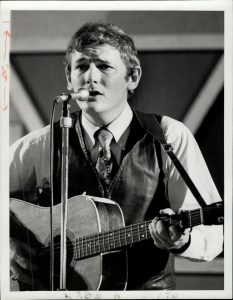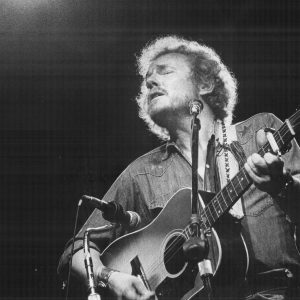
Lightfoot in the 1960s
Legendary singer-songwriter and SOCAN member Gordon Lightfoot, whose work spanned more than 60 years, has died at the age of 84, on May 1, 2023. His exact cause of death wasn’t immediately available, though he had been suffering from emphysema, and reports say he died peacefully, of natural causes.
“Gordon Lightfoot was one of the greatest Canadian songwriters to ever put pen to paper, and lyrics to music,” said SOCAN CEO Jennifer Brown. “His music not only helped define the 1960s and early 1970s, but has proven itself true for all generations, everywhere in the world. SOCAN was privileged to count Gordon Lightfoot among our most celebrated members. He’ll be truly missed, and his songs will continue to be cherished by music lovers for as long as people listen to music. He’s an indelible part of the Canadian national spirit.”
Among countless honours, Lightfoot received the Governor’s General Award, and was inducted into the Order of Canada. He also earned the SOCAN Lifetime Achievement Award in 2014 (and four other SOCAN Awards), as well as 17 JUNO Awards, four Grammy nominations, and was inducted into both Canada’s Walk of Fame and The Canadian Songwriters Hall of Fame. Lightfoot is also in the Canadian Country Music Hall of Fame, and at the 1986 JUNO Awards, he was inducted into the Canadian Music Hall of Fame by his friend and musical colleague, Bob Dylan, who has always complimented Lightfoot’s songwriting skills. His radio hits in the U.S. have earned five No. 1s, five Top 10s, and 13 Top 40 hits; In Canada, he’s earned 16 No. 1s, 18 Top 10s and 21 Top 40 hits.
Lightfoot’s vast catalogue includes such all-time classics as “Early Morning Rain,” “If You Could Read My Mind,” “Carefree Highway,” “Sundown,” “(That’s What You Get) For Lovin’ Me,” “The Wreck of the Edmund Fitzgerald,” and “Canadian Railroad Trilogy,” to name just a few. His songs have been covered by Bob Dylan, Elvis Presley, Neil Young, Rose Cousins, Johnny Cash, Jerry Lee Lewis, Anne Murray, Sarah McLachlan, Barbra Streisand, Harry Belafonte, Jane’s Addiction, Lori Cullen, Glen Campbell, Toby Keith, Eric Clapton, and many more.
Lightfoot’s songs are poetic in language but realistic in content, and his clear, resonant voice and often minimal backing (of electric bass and acoustic lead guitar) only add to the listening experience. In the mid-1960s, he broke out as a folk songwriter, but his work in the 1970s cemented him as a key figure – alongside James Taylor, Joni Mitchell, Jackson Browne, Carole King, and several others – in the singer-songwriter movement of the era.
While Lightfoot’s more personal songs of romantic relationships gone wrong (like “Sundown,” “If You Could Read my Mind,” and “Carefree Highway”) have always resonated with a global audience, his distinctly Canadian historical-narrative anthems (like “The Wreck of the Edmund Fitzgerald” and “Canadian Railroad Trilogy”) capture our unique national heritage and spirit, and resound even more strongly in Canada.
Lightfoot was born in Orillia, ON, taught himself to play guitar as a youth, and began performing with a folk group called the Teen Timers, then took up drumming, and singing with a barbershop quartet. After high school, he moved to California to study composition, and sang for awhile in a big-band jazz group. He returned to Toronto, and in 1960, joined a vocal group chorus on the TV show Country Hoedown. Lightfoot formed a singing duo with Terry Whalen, the Two Tones, who played at the Mariposa Folk Festival, and released an album in 1962. Wanting to pursue a solo career, he then moved to the U.K. and hosted an eight-week BBC-TV series, The Country & Western Show. He’d started to play occasional solo dates, and had a hit in Ontario with “Remember Me (I’m the One).”
In 1963, he discovered Dylan and began to write songs in a new, more personal style. Folk duo Ian & Sylvia heard Lightfoot performing in Toronto, and enjoyed his songs enough to add some of them to their repertoire. They also brought Lightfoot to the attention of their (and Dylan’s) manager, Albert Grossman, who signed the young singer-songwriter to a deal. Several artists began to have hits covering his songs, like Peter, Paul & Mary (“Early Morning Rain” and “(That’s What You Get) For Lovin Me,”) and Marty Robbins (“Ribbon of Darkness”). In 1966, Lightfoot signed a recording contract with United Artists, and from 1967 to 1969, he recorded four studio albums and a live LP for them. He became a major star in Canada, releasing hit singles and headlining an annual, sold-out concert series at Toronto’s Massey Hall – where he played more than 170 times, more than any other performer.
In 1970, his contract with United Artists expired, he broke with Grossman, and signed a new record deal with the Reprise label. His first album for them, Sit Down Young Stranger, spawned a long-overdue U.S. hit, “If You Could Read My Mind.” It reached the Top Five of the pop charts, and after the album was re-titled If You Could Read My Mind, the LP also reached the Top 10. In 1971, he released Summer Side of Life, and in 1972, Don Quixote and Old Dan’s Records, but he had to temporarily stop touring when he was diagnosed with Bell’s Palsy. In 1974, he returned with the album Sundown, which included the title song and “Carefree Highway,” both of which became major hit singles, and his next two albums would also feature pop hits: Summertime Dream included “The Wreck of the Edmund Fitzgerald,” and Cold on the Shoulder included “Rainy Day People.”

Lightfoot in the 1970s
The 1975 “best of” compilation Gord’s Gold featured new re-recordings of 10 songs from his days at United Artists, and 12 of his more recent hits of the day. He continued to record and tour regularly, and his annual run of performances at Massey Hall confirmed his large and loyal audience. Lightfoot began playing benefit shows for various charitable concerns, including world hunger and the environment, and tried his hand at acting, appearing in the 1982 films Harry Tracy and Desperado, and playing a country singer on the American TV series Hotel in 1988.
Lightfoot experienced a creative revival in the 1990s, recording two of his best-reviewed albums in decades, 1993’s Waiting for You and 1998’s A Painter Passing Through, but in 2002 he suffered an abdominal aortic aneurysm. He was in a coma for six weeks, and in the hospital for three months. He survived the illness, and in 2004 released Harmony, an album he’d begun working on before he fell ill; by the end of the year, he was back on the road. Lightfoot experienced another health scare in the fall of 2006, when he suffered a minor stroke that cost him some mobility in his right hand, but within six months he was able to play guitar again and continued to perform on a regular basis.
In 2012, Lightfoot released All Live, a collection of recordings from his many appearances at Massey Hall. He toured regularly into the late 2010s, and released the double-disc collection The Complete Singles 1970-1980 in 2019. After discovering a set of demos of unreleased songs, written in 2001 and 2002, Lightfoot recorded 10 of them, accompanied only by his acoustic guitar, for 2020’s Solo – his first studio album in 16 years.
Lightfoot is survived by his wife, Kim; six children — Fred, Ingrid, Galen, Eric, Miles, and Meredith; and several grandchildren.
On behalf of its more than 185,000 songwriter, composer, screen composer, and publisher members, SOCAN offers its sincerest condolences to Gordon Lightfoot’s family, friends, loved ones, and fans all over the world.
For an in-depth look at Lightfoot’s life and work, play the CBC Gem documentary, Gordon Lightfoot: If You Could Read My Mind.

Lightfoot playing live at the Mariposa Folk Festival in 2022. (Photo: Brad Ardley)

